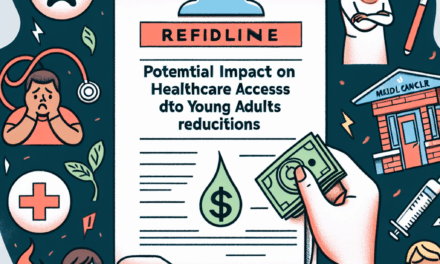Trump Administration to Close Minority Health Offices in CMS and HHS During Restructuring
The Trump administration’s decision to close minority health offices within the Centers for Medicare & Medicaid Services (CMS) and the Department of Health and Human Services (HHS) has sparked significant debate and concern among health advocates, policymakers, and minority communities. This article delves into the implications of this decision, exploring its potential impact on health equity, access to care, and the broader landscape of public health in the United States. We will examine the historical context of these offices, the rationale behind their closure, the potential consequences for minority health, and the responses from various stakeholders.
Historical Context of Minority Health Offices
The establishment of minority health offices within CMS and HHS was a response to the persistent health disparities faced by racial and ethnic minorities in the United States. These offices were created to address the unique health challenges that these populations encounter, including higher rates of chronic diseases, limited access to healthcare, and socioeconomic barriers.
In 1985, the U.S. Department of Health and Human Services released the landmark report “Health Status of Minorities and Low-Income Groups,” which highlighted the significant health disparities affecting these populations. This report laid the groundwork for the establishment of the Office of Minority Health (OMH) within HHS in 1986. The OMH was tasked with improving the health of racial and ethnic minorities through policy development, research, and community engagement.
Over the years, the OMH has played a crucial role in promoting health equity by implementing programs aimed at reducing disparities in health outcomes. For instance, initiatives such as the National Partnership for Action to End Health Disparities and the Minority Health Initiative have sought to address the social determinants of health that disproportionately affect minority communities.
Similarly, CMS established its own Office of Minority Health to ensure that Medicare and Medicaid programs effectively serve diverse populations. This office has been instrumental in developing culturally competent care models and promoting outreach efforts to engage minority communities in health programs.
The Rationale Behind the Closure
The Trump administration’s decision to close these minority health offices was framed as part of a broader restructuring effort aimed at increasing efficiency and reducing government spending. Proponents of the closure argued that consolidating resources would streamline operations and eliminate redundancy within the federal health bureaucracy.
However, critics of this rationale contend that the closure of these offices undermines the federal government’s commitment to addressing health disparities. They argue that minority health offices are essential for ensuring that the unique needs of diverse populations are considered in health policy and program development.
Moreover, the administration’s focus on deregulation and reducing the size of government has raised concerns about the potential erosion of protections for vulnerable populations. The closure of minority health offices may signal a shift away from prioritizing health equity and could exacerbate existing disparities in healthcare access and outcomes.
In addition to concerns about efficiency, some administration officials have suggested that the closure of these offices reflects a belief that health disparities can be addressed through market-based solutions rather than targeted government interventions. This perspective raises questions about the effectiveness of relying solely on market forces to improve health outcomes for minority populations.
Potential Consequences for Minority Health
The closure of minority health offices within CMS and HHS could have far-reaching consequences for the health of racial and ethnic minorities in the United States. Without dedicated offices focused on minority health, there is a risk that the unique challenges faced by these populations will be overlooked in policy discussions and program implementation.
One immediate concern is the potential loss of funding for programs that specifically target health disparities. Minority health offices have historically been responsible for allocating resources to initiatives aimed at improving access to care, promoting preventive services, and addressing social determinants of health. The closure of these offices could lead to a reduction in funding for such programs, further exacerbating health disparities.
Additionally, the absence of minority health offices may hinder efforts to collect and analyze data on health outcomes among diverse populations. Data disaggregation is crucial for understanding the specific health needs of different racial and ethnic groups. Without dedicated offices to oversee this work, there is a risk that important data will be lost or underutilized, making it more difficult to develop effective interventions.
Furthermore, the closure of these offices may lead to a decline in community engagement and outreach efforts. Minority health offices have historically served as a bridge between government agencies and minority communities, facilitating communication and collaboration. The loss of this connection could result in decreased trust in government health programs and a reluctance among minority populations to seek care.
Responses from Stakeholders
The decision to close minority health offices has elicited strong reactions from a wide range of stakeholders, including health advocates, community organizations, and policymakers. Many have expressed concern that this move will undermine progress made in addressing health disparities and erode trust between minority communities and the federal government.
Health advocacy organizations, such as the National Minority Quality Forum and the National Association of Community Health Centers, have issued statements condemning the closure. They argue that the elimination of minority health offices sends a message that the health needs of racial and ethnic minorities are not a priority for the federal government.
In response to the closure, some community organizations have mobilized to advocate for the reinstatement of these offices. They emphasize the importance of having dedicated resources to address the unique health challenges faced by minority populations and call for increased funding for programs that promote health equity.
Policymakers from both sides of the aisle have also weighed in on the issue. Some Democratic lawmakers have criticized the closure as a step backward in the fight for health equity, while a few Republican lawmakers have expressed support for maintaining minority health offices as a means of ensuring that all Americans have access to quality healthcare.
Additionally, public health experts have raised concerns about the potential long-term consequences of closing these offices. They argue that without a dedicated focus on minority health, the federal government risks losing ground in the fight against health disparities, which could have implications for overall public health in the United States.
Case Studies and Examples
To better understand the potential impact of closing minority health offices, it is helpful to examine case studies and examples of successful initiatives that have emerged from these offices. These examples illustrate the critical role that minority health offices have played in addressing health disparities and improving health outcomes for racial and ethnic minorities.
- The National Partnership for Action to End Health Disparities: This initiative, launched by the Office of Minority Health, aimed to engage communities, organizations, and stakeholders in a collaborative effort to reduce health disparities. The partnership brought together diverse groups to develop action plans and strategies tailored to the specific needs of different populations.
- The Minority Health Initiative: This program focused on increasing access to preventive services for minority populations. By providing funding for community health centers and outreach programs, the initiative helped to improve health outcomes for underserved communities.
- Data Collection and Analysis: Minority health offices have been instrumental in collecting and analyzing data on health disparities. For example, the OMH has published reports highlighting the health status of various racial and ethnic groups, providing valuable insights for policymakers and public health officials.
- Culturally Competent Care Models: The Office of Minority Health has developed training programs for healthcare providers to promote culturally competent care. These programs have helped to improve communication and trust between providers and minority patients, leading to better health outcomes.
- Community Engagement Initiatives: Minority health offices have facilitated community engagement efforts to raise awareness about health issues affecting minority populations. These initiatives have empowered communities to advocate for their health needs and have fostered collaboration between community organizations and government agencies.
These case studies underscore the importance of having dedicated resources to address health disparities. The closure of minority health offices could jeopardize similar initiatives and hinder progress in improving health outcomes for racial and ethnic minorities.
Conclusion
The decision to close minority health offices within CMS and HHS during the Trump administration’s restructuring raises significant concerns about the future of health equity in the United States. These offices have played a vital role in addressing health disparities, promoting culturally competent care, and engaging minority communities in health initiatives.
As we have explored in this article, the closure of these offices could have far-reaching consequences, including reduced funding for programs targeting health disparities, diminished data collection efforts, and weakened community engagement. The responses from stakeholders highlight the widespread concern about the potential erosion of progress made in addressing health inequities.
Moving forward, it is essential for policymakers, health advocates, and community organizations to work collaboratively to ensure that the health needs of racial and ethnic minorities remain a priority. This may involve advocating for the reinstatement of minority health offices, increasing funding for health equity initiatives, and fostering partnerships between government agencies and community organizations.
Ultimately, the health of our nation depends on our ability to address disparities and ensure that all individuals, regardless of their race or ethnicity, have access to quality healthcare. The closure of minority health offices represents a critical juncture in this ongoing struggle for health equity, and it is imperative that we remain vigilant in advocating for the needs of underserved populations.




